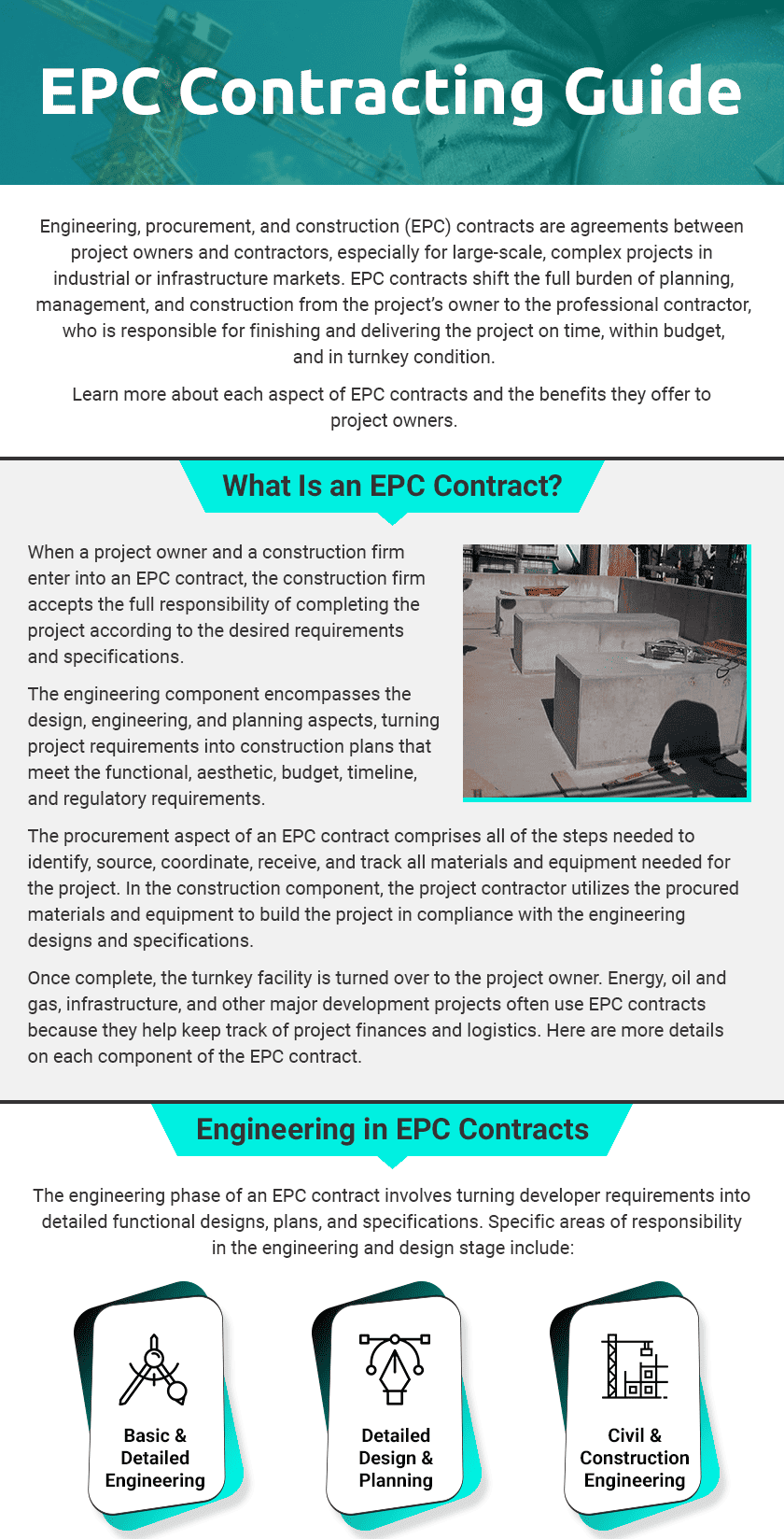Engineering, procurement, and construction (EPC) contracts are agreements between project owners and contractors, especially for large-scale, complex projects in industrial or infrastructure markets. EPC contracts shift the full burden of planning, management, and construction from the project’s owner to the professional contractor, who is responsible for finishing and delivering the project on time, within budget, and in turnkey condition.
Learn more about each aspect of EPC contracts and the benefits they offer to project owners.
What Is an EPC Contract?
When a project owner and a construction firm enter into an EPC contract, the construction firm accepts the full responsibility of completing the project according to the desired requirements and specifications.
The engineering component encompasses the design, engineering, and planning aspects, turning project requirements into construction plans that meet the functional, aesthetic, budget, timeline, and regulatory requirements.
The procurement aspect of an EPC contract comprises all of the steps needed to identify, source, coordinate, receive, and track all materials and equipment needed for the project. In the construction component, the project contractor utilizes the procured materials and equipment to build the project in compliance with the engineering designs and specifications.
Once complete, the turnkey facility is turned over to the project owner. Energy, oil and gas, infrastructure, and other major development projects often use EPC contracts because they help keep track of project finances and logistics. Here are more details on each component of the EPC contract.
Engineering in EPC Contracts
The engineering phase of an EPC contract involves turning developer requirements into detailed functional designs, plans, and specifications. Specific areas of responsibility in the engineering and design stage include:
- Basic and detailed engineering
- Detailed design and planning
- Civil and construction engineering
Procurement in EPC Contracts
Once detailed construction designs and plans are agreed upon, the procurement phase turns those plans into physical materials that meet the project budget and timeline. Activities in the procurement process include:
- Material identification and sourcing
- Logistics and transportation
- Invoicing and purchasing
- Receiving and tracking material inventories
Construction in EPC Contracts
The construction stage converts the procured materials into finished structures and facilities according to the plans. Tasks for the construction component cover the full range of work depending on the scope and nature of the project, including:
- Concrete and masonry
- Water supply, sanitation, wastewater management, piping, and drainage
- Structural framing
- Pavements and foundations
- Furniture construction, such as cabinets, showcases, and cupboards
- Interior and exterior finishing
- Welding and metal fabrication
- Wiring and electrical
- All other tasks required to complete the project
Advantages of EPC Contracts
EPC contracts can be a great benefit to any developer or organization wishing to complete a project in a timely manner without the responsibilities of directly overseeing design, bidding, and construction. Project owners using EPC contracts will benefit from:
Time Savings
EPC contractors provide the efficiency of a single responsible party with the experience, equipment, staffing, and industry connections to finish projects by a fixed date specified in the contract. Completion is guaranteed, and penalties for failure to meet delivery dates are covered by performance bonds detailed in individual EPC contracts.
Reduced Expenses
While some EPC contracts specify a time- and materials-based price, the vast majority feature a fixed price, with liabilities typically shared between contractors and other parties as specified in the contract.
Quality and Security
Contractors generally guarantee their ability to satisfy an EPC contract with a performance security or bond, which limits the financial losses of the project owner if work is not completed satisfactorily. Contractors must meet project performance specifications, and if they don’t, the liability for project owners is limited.
Versatility and Flexibility
In EPC contracts, provisions are generally included for project owners to order variations or to suspend work altogether. Protections are also usually granted by force majeure clauses, which excuse both parties from responsibility if an extraordinary event, like a natural disaster, delays or stops progress on the project.
Construction Services from Base Construction
With our commitment to safety and quality and more than 25 years of experience, Base Construction Inc. has completed more than 8,000 projects for industrial, manufacturing, power generation, and many other industries under our California State License No. 715316. With Class A (general engineering), B (general building), and C-36 (plumbing) licenses, our services include:
- Process piping
- Concrete foundations, footing, and slab
- Welding
- Structural steel fabrication and installation
- IMP walls
- Office construction and renovation
- ADA-compliant restroom and plumbing renovations
- Mechanical and electrical control equipment installation
- Turnkey projects
- Secondary services: insulation, painting, asphalt, concrete epoxy coating, stormwater control
Request a quote today to learn how we can help with your next construction project.
